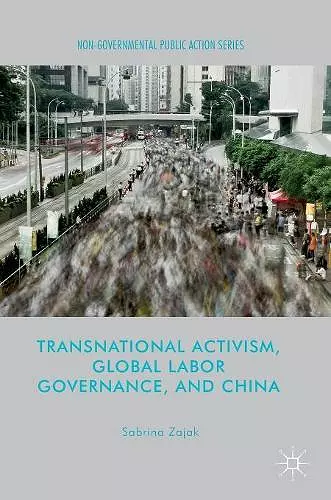Transnational Activism, Global Labor Governance, and China
Format:Hardback
Publisher:Palgrave Macmillan
Published:19th Jan '17
Should be back in stock very soon
This hardback is available in another edition too:
- Paperback£89.99(9781349957071)

"This innovative study aptly blends different but thus far disconnected bodies of literature to analyze the various pathways, including transnational political activism, to enhance labor rights in China. The book enriches our understanding of a complex and multi-layered system of interaction that leads to a slow and selective convergence between Chinese labor politics and international standards." (Dieter Rucht, Professor Emeritus, Wissenschaftszentrum Berlin and the Freie Universitat Berlin, Germany) "Social movement studies have often worked under the implicit assumption that protests only develops in democracy. This rich analysis of labour activism in China convincingly points instead at the multilevel dynamics that allow for new labour transnationalism. It shows how different actors build networks across places of production and consumption within the complex multilevel architecture of global labour." (Donatella della Porta, Professor of Political Science, Scuola Normale Superiore, Italy) "Labor rights in China have been in the global spotlight for nearly three decades. While most research focuses on a single great hope for improving workers' rights, this book provides a valuable account of the multiple paths that global reformers have taken, from corporate social responsibility to diplomacy to the promotion of civil society." (Tim Bartley, Associate Professor of Sociology, Ohio State University, USA) "This is a theoretically-informed and empirically-grounded book. Sabrina Zajak offers a timely account on how multi-level actors interact with each other to shape labor rights in China. It makes substantial contributions to globalization, China and labor studies." (Chris King-Chi Chan, Associate Professor of Sociology, City University of Hong Kong)
The book presents a novel multi-level approach capturing how trade unions and labor rights NGOs have mobilized along different pathways while attempting to influence labor standards in Chinese supply chains since 1989: within the ILO, within the European Union, leveraging global brands or directly supporting domestic labor rights NGOs.
This book explores rising labor unrest in China as it integrates into the global political economy. The book highlights the tensions present between China’s efforts to internationalize and accept claims to respect freedom of association rights, and its continuing insistence on a restrictive, and often punitive, approach to worker organizations. The author examines how the global labor movement can support the improvement of working conditions in Chinese factories. The book presents a novel multi-level approach capturing how trade unions and labor rights NGOs have mobilized along different pathways while attempting to influence labor standards in Chinese supply chains since 1989: within the ILO, within the European Union, leveraging global brands or directly supporting domestic labor rights NGOs. Based on extensive fieldwork in Europe, the US and China, the book shows that activists, by operating at multiple scales, were on some occasions able to support improvements over time. It also indicates how a politically and economically strong state such as China can affect transnational labor activism, by directly and indirectly undermining the opportunities that organized civil societies have to participate in the evolving global labor governance architecture.
“This is a very good book, and I liked the book a lot after reading it. … The rich information of this book makes it an excellent introduction to the field as well as to the case of China. Zajak is no doubt a first-rate labor scholar, and this book will be a must read to anyone interested in transnational activism or labor-rights activism in China.” (Dingxin Zhao, Mobilization, Vol. 22, September, 2017)
ISBN: 9781349950218
Dimensions: unknown
Weight: unknown
286 pages
1st ed. 2017